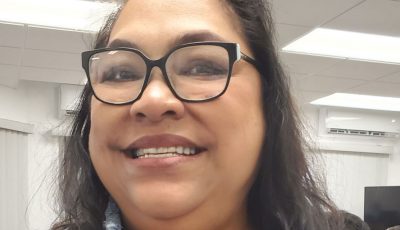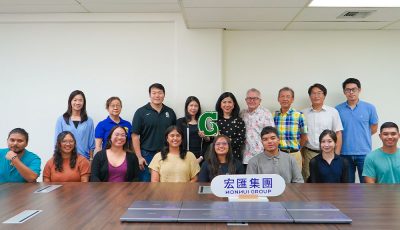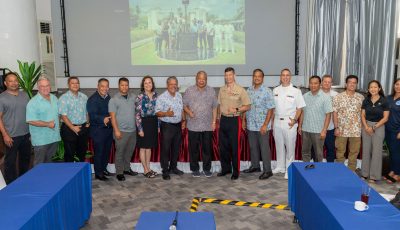BECQ reviews options for Tinian’s military waste
With proposed military impact on the island of Tinian and an unpermitted dump acting as the island’s one waste site, the Bureau of Environmental and Coastal Quality would like to see Tinian have its own landfill but the small size of the customer base there may not be enough to make creating one worth it.
“We would like to see proper management of solid waste down on Tinian, and Rota as well. However, we also understand [the Department of Public Works] is open to the idea of transporting solid waste from Tinian to [the Marpi] landfill [on Saipan]. That is really their call. But I suspect that if that should be the preferred option, then they need to understand that the life of the landfill here is going to be greatly reduced because now you’re bringing in other waste stream from off island,” BECQ administrator Frank Rabauliman said.
While he would like see waste generated on Saipan be managed on island and solid waste on Tinian be managed there as well as for Rota, he said he understands that the cost of a landfill on Tinian would be “very expensive to build and operate.”
Rabauliman said there is not enough customer base on Tinian to support the proper management of a landfill.
Right now, Tinian operates an open dumpsite. In 2006, the Tinian mayor declared a state of emergency citing the government’s failure to close the dump.
Rabauliman said they have worked closely with DPW since 2007 to operate the dump.
He said at times there have been reports that the dumpsite would catch fire.
“The last thing you want to do is see a dump burn. You don’t know the kind of stuff that is in there that could emit toxic fumes. Those are the things that keep us busy working with the operators,” he said.
Right now, the site of a Tinian landfill is “up in the air” as discussion between the military and the municipality on where the site should be is ongoing.
While they are moving forward with a transfer station, he said such a station would house solid waste temporarily, and so a need for landfill would still have to be addressed.
As with the original proposed location, he suspects that new studies for a new landfill site will cost a “substantial amount.”
David Rosario, who was part of an ad-hoc meeting with Marine Corps Forces Pacific and other government agencies on the military’s solid waste management on Tinian last month, said the options have been narrowed down to a construction of a Fukuoka landfill, or the shipping of waste to the Marpi landfill on Saipan.
The Fukuoka option would require 15 hectares of land, he said.
A Fukuoka landfill is a semi-aerobic landfill that uses a collecting pipe at the base of the landfill to remove leachate. Natural air is brought up from the open pit of the leachate-collecting pipe to the landfill layer where it promotes decomposition of waste.
Rosario noted that there has not been a Fukuoka landfill that has been permitted in the U.S., with the ones permitted being in Yap, Palau, Japan, and Samoa.
Rosario said the U.S. military would do a study of the Marpi landfill and communicate with the Commonwealth Ports Authority on how they would load the waste between Tinian and Saipan ports.
“They’re going to do all those studies, and come back to us in mid-January so we can look at both of those options again,” Rosario said.
The four initial options were incineration of solid waste, use of waste-to-energy technologies, a Fukuoka landfill, or transfer to an off-island facility.
MarForPac initiated in August a waste stream analysis to determine which disposal options would be carried forward into a feasibility study. A “normal scenario” of military impact and an increased scenario of 45 weeks were estimated.
With a peak military population of 3,100 personnel on Tinian four weeks a year, MarForPac estimated 607,600 lbs of municipal solid waste.
For the “off-peak” of 16 weeks with an average of 755 military personnel, waste was estimated at 591,920 lbs.



























